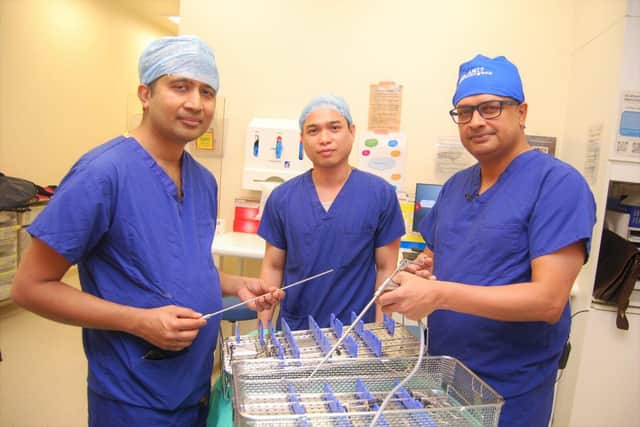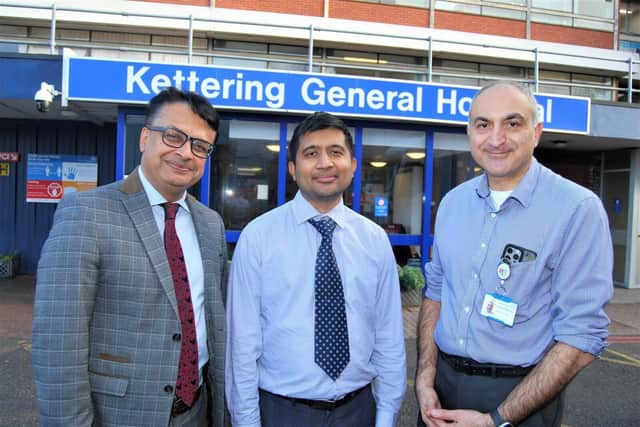Amazing new form of spinal disc surgery through pencil-thin tube delivered to first patients at KGH
and live on Freeview channel 276
Spinal surgeons at Kettering General Hospital have performed Northamptonshire’s first ever operation to remove a disc from a person’s spine using an endoscopic camera/surgical tool almost as thin as a pencil.
The procedure, called an endoscopic discectomy is carried out under general, or potentially local, anaesthetic into the spine and the hospital’s first ever procedure was carried out on January 31.
Advertisement
Hide AdAdvertisement
Hide AdIt is a significant advance in spinal surgery that is now being adopted across the world after being pioneered in Japan and the USA – but in the UK tends to be available only in specialist hospitals in places like London and Manchester.


It is an advance on previous key-hole operations such as the first ever keyhole discectomy for Northamptonshire performed at KGH in March 2021.
Consultant Neurosurgeon and Spinal Surgeon Mr Amit Amit, who is one of the surgeons performing the new operation, said: “This new procedure is steps ahead of even the key-hole discectomy procedures we started at KGH in 2021.
“Essentially we make a small puncture wound in the back near the damaged disc and use the endoscopic camera to examine the problem area.
Advertisement
Hide AdAdvertisement
Hide Ad“Then using surgical tools within that very thin camera scope we pull out the damaged disc and exit through the small puncture point we entered through.”


The new operation is beneficial because its smaller wound size reduces the risk of infection and post-operative pain and enables a faster recovery than a traditional open procedure with a much larger incision.
Mr Amit said: “Most people with disc problems do not need surgery but where conservative treatment has failed and the person has significant pain, or the disc presses on nerves, it can be an effective and appropriate treatment.
“Myself and other surgeons at the hospital have been trained in the new technique and our first operation was overseen by an expert in the technique - Lt Col Mr David Baxter from the Royal National Orthopaedic Hospital at Stanmore.
Advertisement
Hide AdAdvertisement
Hide Ad“On January 31 we did the first operation which took about one hour to perform and it was done as a day case with the patient able to go home the same day.
“We are the first surgeons in Northamptonshire to deliver this operation and some of the first in the region outside of specialist orthopaedic hospitals.”
The patient’s experience
Mother-of-three Hannah Martin, 31, from Rushden, was the first patient to have the procedure.
She said: “My disc issue was identified on an MRI in February last year but by October I found I was losing strength in my left leg because the herniated disc was pressing on my nerve.
Advertisement
Hide AdAdvertisement
Hide Ad“It got worse and worse until my leg became numb and I could only walk for a short distance before my leg started dragging behind me, which was a big issue for me as I am a housekeeper in a hotel.
“This new way of having a discectomy to relieve the pressure was discussed with me and I had the operation in the morning and was home in the late afternoon.
“I know it can take some weeks to see how well it went but already I can move my foot and leg much more easily. I was so excited when I worked with my physio they said I had to calm down.
“For the people who need this kind of operation it looks like a fantastic advance that can help really make a difference.”
Patients will normally recover well from the new operation in 3-4 weeks and are often able to resume many normal activities right away.